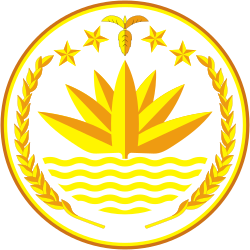| Appellate Division of the Supreme Court of Bangladesh | |
|---|---|
| বাংলাদেশ সুপ্রীম কোর্টের আপীল বিভাগ | |
 Supreme Court of Bangladesh Logo | |
 Interactive map of Appellate Division of the Supreme Court of Bangladesh | |
| 23°43′51″N90°24′09″E / 23.730777°N 90.402458°E | |
| Location | Ramna, Dhaka 1000, Bangladesh |
| Coordinates | 23°43′51″N90°24′09″E / 23.730777°N 90.402458°E |
| Authorised by | Constitution of Bangladesh |
| Website | www |
| Chief Justice of Bangladesh | |
| Currently | Zubayer Rahman Chowdhury |
| Since | 28 December 2025 |
 |
|---|
The Appellate Division, Supreme Court of Bangladesh is the highest appellate court in the country. [1] It serves as the final court of appeal for all civil and criminal cases, with appellate review authority over judgements of the High Court Division. [2] [3]
Contents
- History
- Jurisdiction
- Appellate Jurisdiction
- Issue and execution of appellate processes
- Power of Review
- Advisory Jurisdiction
- Rule making power
- Justices of the Appellate Division
- References
The Court is currently composed of 6 judges, led by Chief Justice Zubayer Rahman Chowdhury .


